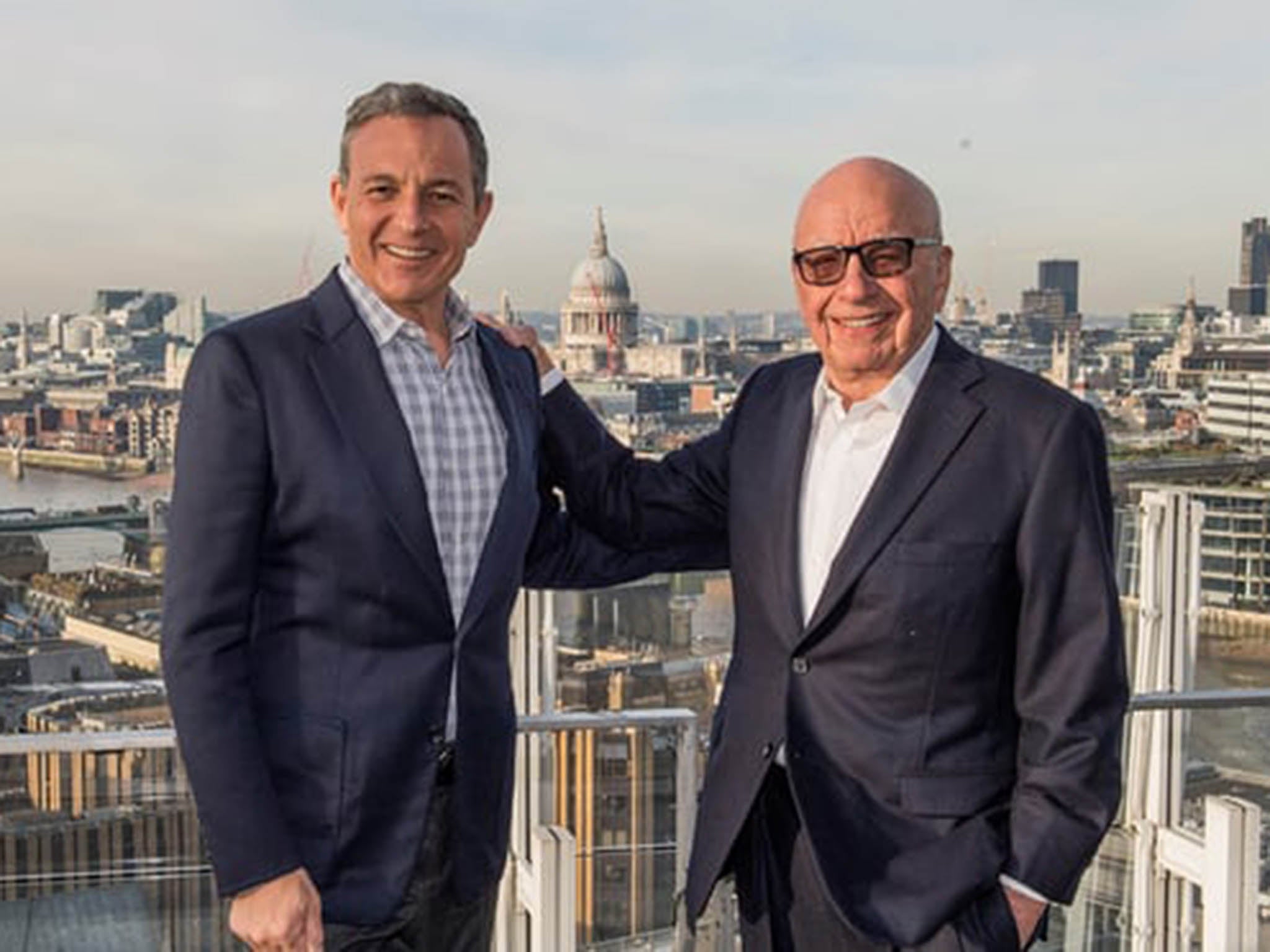When media giants like Disney and Fox merge we should be thinking of the interests of consumers, not bosses
The epic deal last week by Disney to buy most of Rupert Murdoch’s Fox movie and TV assets and also his share in the streaming service Hulu was heavily motivated by the rise of Netflix and Amazon Prime


Your support helps us to tell the story
From reproductive rights to climate change to Big Tech, The Independent is on the ground when the story is developing. Whether it's investigating the financials of Elon Musk's pro-Trump PAC or producing our latest documentary, 'The A Word', which shines a light on the American women fighting for reproductive rights, we know how important it is to parse out the facts from the messaging.
At such a critical moment in US history, we need reporters on the ground. Your donation allows us to keep sending journalists to speak to both sides of the story.
The Independent is trusted by Americans across the entire political spectrum. And unlike many other quality news outlets, we choose not to lock Americans out of our reporting and analysis with paywalls. We believe quality journalism should be available to everyone, paid for by those who can afford it.
Your support makes all the difference.Imagine a business model that enabled your firm to compel customers to purchase things from you that they wouldn’t otherwise buy. To sellers it probably sounds like a dream. To buyers it sounds like a bad joke. But it’s neither a dream nor a joke. It’s called bundling.
Many people purchase a satellite or cable TV subscription for a particular piece of content – maybe live Premier League football matches or episodes of Game of Thrones – and watch none, or little, of the other stuff available as part of their subscription.
Even the most voracious devourers of entertainment will only ever consume a small fraction of what they have access to as part of their packages. There are, after all, only so many hours in a day, even for telly addicts.
Consumers would be better off financially if they only paid for what they actually consumed. But under this arrangement the media companies would be worse off. So instead of offering pay-as-you-watch deals, they bundle.
Sky in the UK and the big cable companies in the US have extracted large profits from this selling practice in recent decades. They’ve used their exclusive rights to some forms of sports broadcasting or other premium entertainment content to effectively compel customers to buy bigger packages.
But new technology in the form of internet streaming subscription channels now presents a commercial challenge to these bundlers. In the US, financial analysts talk of “cord cutting”, to describe Americans ditching their expensive cable connections in favour of cheaper streaming services.
The epic deal last week by Disney to buy most of Rupert Murdoch’s Fox movie and TV assets and also his share in the streaming service Hulu was heavily motivated by the rise of Netflix and Amazon Prime.
Disney is preparing to invest in its own streaming platform, leveraging its vast catalogue of exclusive films, TV shows and sports rights.
Yet streaming has not killed bundling, but rather re-invented it in a new form. The streaming companies, of course, have their own bundles. If you want access to their own burgeoning exclusive content, you have to buy the whole package. These are cheaper than satellite or cable bundles, though the cost soon adds up if you have more than one.
So what should we make of media bundling from an economic perspective?
Bundling is essentially a way of firms to extract the “consumer surplus”, a reference to the difference between the maximum customers would be willing to pay for something and what they would be asked to pay in conditions of perfect competition.
Of course, as this implies, consumer surplus extraction is only possible because competition is imperfect and sellers have some degree of market power. So should we consumers be outraged at the existence of bundling? Should we be demanding regulatory intervention to prevent it happening?
It depends. High profits for media companies from bundling might be seen as socially useful if the surpluses are re-invested in quality cultural or educational content that might not otherwise be made. This kind of welcome cross-subsidy was common in the era when print newspapers (a form of content bundling) had a virtual monopoly on this distribution of written current affairs content. Plenty of superlative, but expensive, foreign and specialist reporting was sustained in that way in the pre-internet era. But if the excess profits from bundling only end up lining shareholders’ pockets this becomes a transfer that simply harms consumers.
And if the practice of bundling serves to stifle competition, blocking potentially innovative new firms from coming into the market, that’s even more damaging to consumer welfare in the long term.
This represents a huge challenge for market regulators in this revolutionary era of instant digital content delivery and the penetration of online giants such as Amazon into a stunning range of new commercial sectors.
The competition authorities in the US and Europe took on the software leviathan Microsoft in the late 1990s and 2000s over its bundling practices. Are they prepared to do the same with the Silicon Valley giants and entertainment conglomerates of today? And should they?
A great deal of the coverage of the Disney-Fox takeover has been from the perspective of the companies themselves and their powerful leaders. Is this the beginning of the end of the Murdoch empire? How long will Disney’s veteran boss Bob Iger stay in his post? Reasonable questions. But a little more consideration to the economic interests of the little people – their customers – would also be in order.
Join our commenting forum
Join thought-provoking conversations, follow other Independent readers and see their replies
Comments